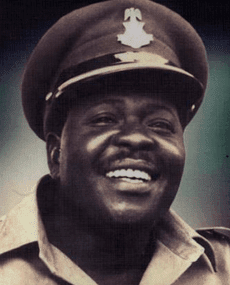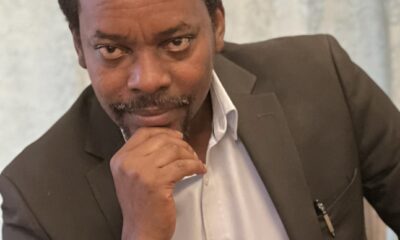National Issues
Adekunle Fajuyi: Bring Back Our History -By Bamidele Williams


Who brought the idea? Who?
I said who brought the idea that History should be removed as a subject from our secondary schools curriculum?
Who?
*_The most effective way to destroy people is to deny and obliterate their own understanding of their history_*.
George Orwell
*_The history of the world is but the biography of great men_*.
Thomas Carlyle
I spoke with a secondary school leaver a few days back on “Adekunle Fajuyi 50 years after…” and I was shocked he had no idea who Fajuyi was.
“What of Aguiyi Ironsi?”
No idea was the answer too.
And it quickly dawned on me that those who stopped the teaching of History in our secondary schools and even threatened it at tertiary level have succeeded in wiping off the memory card of our pertinent stories
Obviously obvious at its pertinent magnitude. They want us to be historically blank and which they are already achieving.
Living heroes are powerful; those dead are doubly so, because though dead, they are never gone. On the contrary, they are believed to have merely transited to the realm of ancestorhood, that zone of reverential omniscience and respectability, of unvarnished verities and settled wisdom, beyond the giddy hustles and petty bickerings of sublunary existence. Which is why in an apparent mix of necromancy and cultic invocation, the present is constantly in dialogue with the past; the verbal structure of societal communication is characterized by a tense and aspect protocol that defies the logic of quotidian time.
Adekunle Fajuyi is Omoluabi in the true Yoruba sense of the word.
Reading a copy of the lecture delivered by that prolific writer and teacher, Prof Niyi Osundare at The International Conference, University of Ibadan on Friday July 29, 2016 as dignitaries from all walks of life converge to remember that gallant,brave and outstanding soldier, Col Adekunle Fajuyi, who was murdered 50 years ago by Northern military officers who massed on the capital of the Western Region to take out then Head of State, Major General Johnson Aguiyi- Ironsi.
He wrote:
” *_Greek memory glows with the Golden Age of Pericles; the Russians are gratefully aware that the epithet ‘great’ in ‘Peter the Great’ is true and valid to its last letter; the English know when to invoke a Chaucer or a Churchill; hardly one day passes in Turkey without some reverential mention of Ataturk; at Rushmore, the United States hew out of a granite rock four faces of those she considered the most pivotal of its Presidents in 0ver 200 years; the brave island of Cuba, Fidel Castro is a stanza in every song. In a most conspicuous spot in Ljubljana, the beautiful capital of Slovenia is a huge statue of France Preseren, patriot and patron saint of Slovenian verse whose lyric throbs in the air each time the Slovenian anthem is sung. And coming closer home, how can we sing Africa’s Freedom song without giving the wind the names of Nehanda, Samoure Toureh, Lumumba, Nkrumah, Mandela, Mandela, Mandela, Mandela_*?
*_Show me your hero…._*
*_You know a country by the kind of people it chooses to celebrate and valorize; you also know it by the kind it seeks to denounce and denigrate. Additionally, you know a country by the caliber of people it seeks to remember, and the type it is anxious to forget_*
*_. Show me your hero and I will tell you who you are. Because in Nigeria our memory is so scanty and skewed, we do not only remember differently; much more frightfully, we remember defectively. Our public spaces are filled with images of patent criminals; our musicians pollute the wind with praise songs for sundry scoundrels with obscenely deep pockets; countless associations mushroom (especially in our institutions of higher learning) peddling all manner of ‘prizes and awards’ to moneyed crooks on a shamefully cash-and-carry basis. The Federal Republic of Nigeria sanctions this gross devaluation of worth/integrity by the way it doles out its ‘national honours’ to recipients many of whom are notorious treasury looters, election riggers and suchlike political jobbers, economic saboteurs such as the ‘round-trip’ pilgrims of the banking sector and the phantom oil-subsidy mafia, the ‘exporters, importers, and manufacturer’s representatives’ of a nation without factories. . . . . .A bizarre logic rules the purpose of the Nigerian national honours roll: the more heinous your crime against the nation, the higher the rank of your award, the more glittering your medal, the firmer the presidential handshake_* ?
*_Were Nigeria a country with a solvent memory bank and an faculty of active remembrance, Adekunle Fajuyi would have his statue in prominent public spaces all over the country, and the story of his gallantry told and retold from generation to generation. For when those mutineers assailed the government house in Ibadan on the night of July 29, 1966, and demanded the head of his guest, General Aguiyi-Ironsi, Nigeria’s head of state, Fajuyi, in the true spirit of Omoluabism, refused to betray his Commander-in-Chief who was also his guest. He stood his ground. He barred the exit of honour from his household with his own body, with his own life. It is worth noting that even in those urgent and mortal moments, Fajuyi had a choice. He could have cut and run. He could have reached for the typical Nigerian option by trading the security of his guest for his own safety and possibly some plum position in the new government that was sure to emerge from the coup. Had he struck this deal and surrendered his guest, he would have triggered a development with far-reaching personal, ethnic, and national repercussions. Perhaps that decision would also have changed the course of Nigerian history and its ethno-regional complexion as we know them today. But he stood his ground. He chose the path of honour. Over my dead body, he said, and the mutineers took him for his word. It takes one akoni (somebody with exceptional courage and valour) to recognize those virtues in another._*
The importance of history is also been further demonstrated in the statement that —without knowledge and keeping historical events and issues, there will be nothing to build on. History is the foundation of all things; everything has a history and knowledge is built always on examples of one past event or another, it is thus a reference point. The Holy Bible asserts that there is nothing new under heaven and also gives a magnanimous portion of it for historical analysis. It is therefore important to know the foundation of what is built as a guide to subsequent developments.
Our youths no longer have idea of life and times of: Tafawa Balewa, Gen. Murtala Muhammed, Herbert Macaulay, Chief Obafemi Awolowo, Dr. Nnamdi Azikiwe, Sir Ahmadu Bello, Chief Anthony Enahoro, Gani Fawehinmi, Balarabe Musa, Funmilayo Ransome Kuti; among others.
It is on this note PIGEONPOST NEWS AGENCY joined the Historical Society of Nigeria and other professional Historian bodies’ in the national clamour for restoration of History as a quintessential subject in our national curriculum.
Bamidele Williams
01/08/2016
08134810254
www.pigeonpostonline.com
Bamidele Williams is a journalist. A public affairs Analyst and Convener, Pigeonpost.

















